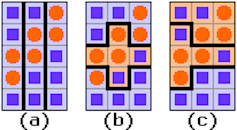Connecting state and local government leaders
COMMENTARY | The public is more aware of partisan gerrymandering than ever – and less supportive of it.
Partisan gerrymandering is when a congressional or state legislative district map is drawn in a way the severely lessens the ability of one party, the minority party, to compete for seats in an election.
The public is more aware of partisan gerrymandering than ever—and less supportive of it.
Reform is happening. In 2018, five states reformed their redistricting processes to reduce partisan gerrymandering. There is the potential for redistricting reform in another seven states before the 2021 redistricting process begins.
A handful of states may even need to redraw their congressional district maps for 2020, if the U.S. Supreme Court upholds the lower courts’ decisions that certain redistricting processes produced extreme partisan gerrymanders.
As a scholar of state politics, I believe that the public should understand how state governments influence citizens’ representation in Congress through redistricting and other voting and election laws.
The Supreme Court decision due in June will determine exactly how much autonomy states have to make the rules for voting and elections.
Redistricting Practices
The U.S. Supreme Court ruled in Baker v. Carr in 1962 that congressional districts must be drawn to ensure that each citizen receives equal representation in Congress and in state legislatures.
Congressional and state legislative district lines are redrawn every ten years to reflect population changes documented by the U.S. Census. This is referred to as the decennial redistricting cycle.
The political party that controls the redistricting cycle in each state will use the process to draw district maps that favor them in elections. Partisan gerrymandering happens when that political party creates a map that makes it virtually impossible for the other party to win in most districts.
Often, this practice results in odd shaped districts that split cities and counties between districts. This can be confusing for a voter, as nearby friends and neighbors may live in a different district and have a different representative.
Current redistricting practices range from completely partisan processes controlled by state legislatures, as is the case in most states, to completely nonpartisan processes controlled by independent commissions.

Change is Happening
In Arizona, California and Michigan, citizens play a significant role in deciding the final legislative district maps.
Citizens in more states are also considering changes to their processes aimed at making the process less political.
These changes range from taking redistricting out of the hands of state legislatures and into independent commissions to requiring support of both the Democratic and Republican legislators to adopt new maps. The goal is a redistricting process that best reflects the political views and values of citizens, which leads to better representation.
Not all states are moving towards reform on their own.
Citizens and groups like the League of Women Voters have challenged partisan gerrymandered maps in Wisconsin, Maryland, North Carolina, Michigan and Ohio.
In all five cases, panels of federal judges ruled that the current congressional maps were extreme partisan gerrymanders and unconstitutional under the First Amendment and Equal Protection Clauses. They ordered that the maps must be redrawn.
All five states appealed these rulings.

The North Carolina and Maryland cases will be decided by the U.S. Supreme Court before the end of June.
The Supreme Court has granted Michigan and Ohio a stay in enforcement of the lower court rulings until it rules on the Maryland and North Carolina cases.
The Wisconsin case is scheduled to be retried by the federal district court in July.
This new wave of partisan gerrymandering legal challenges uses big data and map simulations to demonstrate that unfairness occurred. The federal district courts believe that this processes creates a standard for identifying partisan gerrymandering that can be applied across all cases brought before the courts.
Gerrymandered maps previously came up in cases before the court in 1986 in Indiana, as well as in Pennsylvania in 2004. Both times, the Supreme Court acknowledged that partisan gerrymandering exists, but did not require that maps be thrown out. The court believed that neither case provided a usable standard for identifying partisan gerrymandering that could easily and consistently be applied in all cases brought before the courts. Without that standard, the court ruled that it could not provide a remedy.
All Eyes on SCOTUS
The Supreme Court’s upcoming decision will determine whether citizens can ask the federal courts to resolve partisan gerrymanders or if they need to ask their state courts. A federal standard would apply to all 50 states.
If the court rules that this is a state matter, that would leave decisions up to state constitutions and state law. This could mean that what is considered partisan gerrymandering in one state is not considered partisan gerrymandering in another. The practice of drawing maps that unfairly advantage one political party over another could continue in some states but be banned in others.
The transcripts from the March oral arguments have led me and other court watchers to believe that the court may just be inclined to let the states keep doing what they are doing.
The court is currently split 5-4 and leans conservative. Conservative justices have traditionally favored limited federal government intervention in state politics.
Justices Gorsuch and Kavanaugh, the court’s newest members, are both conservative. They actively questioned the lawyers representing both sides of the cases.
Their questioning indicates that they believe the states are already working to curb extreme partisan gerrymandering. They noted there may be no need for the federal courts to intervene on this issue, because several states, such as Michigan and Ohio, are already adopting reforms intended to result in less partisan maps in 2021.
If the courts happen to agree with the lower court ruling, new maps will need to be drawn for 2020 and again for 2022 as part of the normal redistricting. As Ohio’s attorney general, Dave Yost, argued in appealing the district court’s ruling, such frequent changing of the congressional map could create confusion for voters and problems on election day.
The ACLU countered that an unfair map must be redrawn to provide for effective representation of citizens.
I think it is unlikely that the Supreme Court will rule that there is a federal remedy for partisan gerrymandering. However, citizens are calling for changes to the redistricting process – and many states are hearing that call.
![]()
This article is republished from The Conversation under a Creative Commons license. Read the original article.
Nancy Martorano Miller is an associate professor of political science at the University of Dayton.
NEXT STORY: Young People’s Love of Cities Isn’t a Passing Fad



